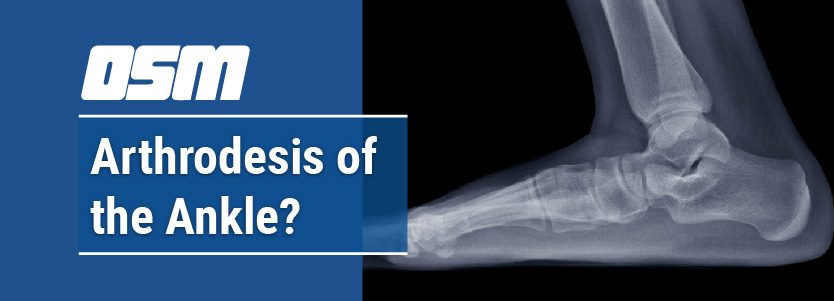Article featured on Mercy Health
What is arthrodesis/surgical fusion of the ankle?
Arthrodesis/surgical fusion is the surgery that joins the bones in your ankle to form a single unit and eliminate movement. You may need this surgery if you have arthritis or another condition where moving your ankle joint is painful. By eliminating the movement, you eliminate the pain.
The bones in your ankle joint are the tibia, fibula and talus. The tibia and fibula are the bones in your lower leg. The talus is the bone that sits right above the heel bone. It acts as a hinge. Arthrodesis fuses the tibia to the talus.
Your doctor opts for arthrodesis over an artificial joint because a fused ankle joint doesn’t wear out. This surgery is a permanent solution and lasts for the rest of your life.
What to expect from arthrodesis/surgical fusion of the ankle
Doctors perform arthrodesis both arthroscopically and as open surgery. Which one your doctor chooses depends on your personal needs. The surgeries are similar in both situations. The main difference is the incisions are smaller in an arthroscopic surgery.
You need general anesthesia for this surgery. That means you’re asleep and don’t feel any pain. Your doctor makes an incision in your skin to access the ankle joint.
The doctor uses a saw or rotary tool to remove cartilage from the surfaces on both sides of your ankle joint. By doing this, your body can fuse the bones together during healing — much like bone heals after a break.
Your doctor inserts screws or metal plates into the joint to hold the bones in the right position so they heal properly. These screws stay in place permanently. They may start to cause pain or affect the joint later on. If that happens, your doctor removes them.
You wear a cast in the first few weeks following the surgery. You need to keep your ankle elevated to prevent swelling and reduce pain, also. The doctor may give you crutches. They’ll also advise you to avoid putting weight on your ankle while the joint heals.
After up to 12 weeks, your doctor removes the cast and replaces it with a brace. As the joint heals, you can put more weight on the ankle. During this time, you work with a physical therapist to learn how to walk with a fused ankle joint.
Shoe modifications and special shoes make walking easier. Though you won’t be able to run normally again, you can walk with a normal gait following arthrodesis.
Common ankle conditions requiring arthrodesis/surgical fusion
If you have severe pain, inflammation and stiffness in your ankle joint due to arthritis, your doctor may recommend arthrodesis. The main types of arthritis that affect your ankle are:
- Osteoarthritis
- Rheumatoid arthritis
- Degenerative arthritis from a previous ankle injury



